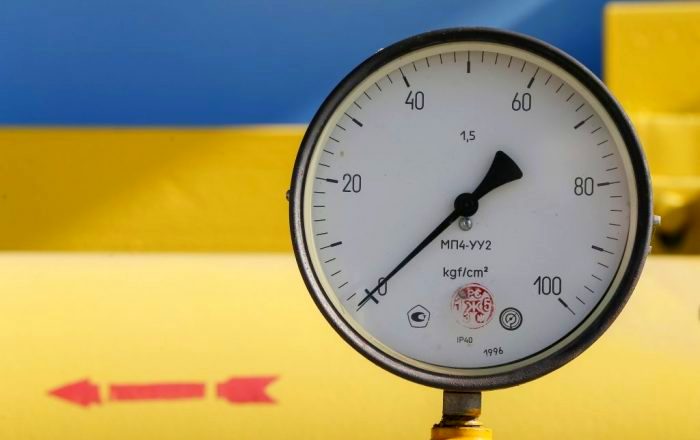In the early hours of 11 May, Russian energy monopoly Gazprom and the Russian Gas Transmission System Operator (TSO), closed off a gas valve on the main Soyuz gas pipeline in Russia.
Shortly after, the Ukrainian Gas TSO noticed an interruption in gas flow after gas valves (located in Russian-occupied regions) on the Novopskov-Shebelynka main gas pipeline were illegally turned off.
As a result, the Ukrainian TSO was unable to fulfil gas transit to Europe, forcing it to call “force majeure” on contracts made with Gazprom on supply towards Europe.
The closure of valves puts an abrupt stop to the transit of up to 32.6 million cubic metres of gas per day: one-third of all Russian gas which reaches Europe.
This is a worrying precedent given Russia’s decision to cut gas supply to Bulgaria and Poland after their refusal to bend to Putin’s demands for “gas-for-Rubles.” Just a few days before, the TSO recorded “unauthorised offtakes of gas” from rebel-held pipelines. In other words, the theft of gas paid for by Europe, redirected to occupied areas of Ukraine.
Putin's 'gas war'
In a comment to The Brussels Times, Andrii Ursta, expert from Ukrainian energy think-tank DiXi group, called the incident “another episode of ‘gas war’ declared by Russia since at least 2021.”
In 2021, Russia effectively blackmailed Europe by refusing to use Ukrainian gas transit infrastructure, thereby creating an artificial shortage of gas, leading to record prices.
Gazprom has a “pump-or-pay” agreement with Ukraine’s state-owned energy company Naftogaz. Russia is obliged to send minimum volumes of gas through Ukrainian gas transit infrastructure or else pay for the capacity it isn’t using.
Normally, the outbreak of war between Russia and Ukraine would render existing agreements between the nations’ gas companies null and void. The Ukrainian TSO, however, says that it has a moral obligation to continue the supply.
“Unlike Russia, we do not use energy as a weapon,” the Ukrainian TSO said on Twitter. “At TSOU we have no interest in leveraging our position as a gas transit corridor to pressure Europe.”
Weaponizing gas supplies
Before the outbreak of the war, Russia regularly sent much less gas than had been paid for in order to weaponize deliveries and force EU politicians to approve the now abandoned Nord Stream 2 project.
“Gazprom undersupplied the European market in circumstances of manifest deficit, which resulted in record-high prices and lower-than-average volumes in European gas storages (especially those owned by Gazprom),” said Ursta.
Ukraine is a leading advocate for the EU to ditch Russian gas, but despite Russia’s energy blackmail, the EU has thus far refused to stop transit lest it jeopardises supply.
But despite previous thinly-veiled manoeuvres to hold Europe hostage to its need for gas, this latest development shows that Russian armed forces are taking a more hands-on approach to weaponizing gas. Following yesterday's shut-off of gas through the Sokhranivka point, Gazprom argued that it was “technically impossible” to transfer gas supply to the Sudzha gas pipeline.
Yet information seen by The Brussels Times suggests that this is untrue. During recent maintenance on the now shut off Sokhranivka pipeline, additional volumes were regularly sent down the Sudzha pipeline.
Gazprom has rejected the Ukrainian TSO’s declaration of “force majeure” and dismisses allegations that Russia had tampered with transit through occupied territories.
Divide-and-conquer
Ukrainian gas transit authorities have regularly flagged to Gazprom the risks the war posed to the safe working of monitoring and compression stations in territories held by Russian forces.
“These manoeuvres by Russians are aimed at discrediting the Ukrainian TSO as an unreliable transit operator in the eyes of the EU – a continuation of 'divide-and-conquer' tactics perfected by the Russians over years of energy supply blackmail,” the DiXi group expert said.
Related News
- Belgium 'fully prepared' as Russia shuts off gas to Poland and Bulgaria
- Belgium threatened by supply shortages on all fronts
Ursta states that Russia's ultimate goal is to further destabilise the European gas market and push prices higher still: "No one can be certain that tomorrow Gazprom will continue to supply the same amount of gas. Uncertainty is Russia's main weapon."
The Ukrainian Gas TSO states that it is “up to Europe” to impose a trade embargo on Russian fuel exports to Europe. In the meantime, it urges Europe not to blame Ukraine for disruptions to gas supply via its territory.

